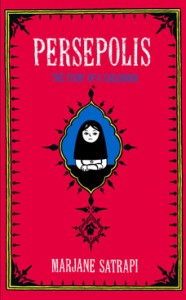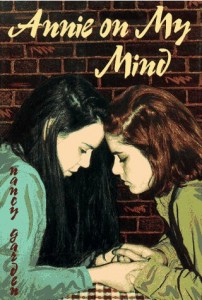 Last month a Chicago Public Schools’ (CPS) directive seemed to require that copies of Marjane Satrapi’s memoir Persepolis be removed from classrooms and school libraries. A later memo clarified that the book was allowed to remain in libraries; the concerns about its content — specifically, visual depictions of acts of torture — were limited to its instructional use in seventh grade.
Last month a Chicago Public Schools’ (CPS) directive seemed to require that copies of Marjane Satrapi’s memoir Persepolis be removed from classrooms and school libraries. A later memo clarified that the book was allowed to remain in libraries; the concerns about its content — specifically, visual depictions of acts of torture — were limited to its instructional use in seventh grade.
How CPS handled this particular situation is beyond the scope of my comments. Similarly I don’t intend to address whether seventh graders are equipped to handle a couple of pages of visually stylized barbarism. Instead, as a librarian, I want to touch on the issue of what belongs in a school library’s collection.
Twenty years ago, I was a school librarian in a central Indiana high school. Comics and graphic novels were not much on librarians’ radars at that time. In fact, the only comics that were in the library’s collection were ones I added: Maus, The Cartoon History of the Universe, and a handful of Garfield and Calvin & Hobbes collections. I wasn’t worried about anyone asking me to remove those books, but I was nervous about some of the other titles I purchased.
 My first day on the job, I found a copy of Nancy Garden’s groundbreaking young adult book Annie on My Mind sitting in my office on a cart, a leftover from the librarian before me. It was there alongside ‘problem’ books — books that needed repair and others that should be removed from the collection (i.e. weeded) for some reason or another. Annie on My Mind, the story of two young women falling in love with one another, wasn’t damaged, and I didn’t see any reason to weed it.
My first day on the job, I found a copy of Nancy Garden’s groundbreaking young adult book Annie on My Mind sitting in my office on a cart, a leftover from the librarian before me. It was there alongside ‘problem’ books — books that needed repair and others that should be removed from the collection (i.e. weeded) for some reason or another. Annie on My Mind, the story of two young women falling in love with one another, wasn’t damaged, and I didn’t see any reason to weed it.
I put the book back out on the shelves for people to read. I did so knowing there were students who were questioning their own sexualities, who had gay and lesbian friends and family members, who would be going out into the wide world where there were all kinds of people. Garden’s book was honest and well written. It met the selection criteria for the library’s collection. It belonged.
That winter I read about the school system in Olathe, Kansas, which ordered all copies of Annie on My Mind removed from its school libraries. The school proposed it had a legitimate right to teach students that homosexuality is wrong, and Garden’s book did not fit that particular pedagogical aim. I worked in a conservative community; would I be forced to remove this book if parents protested?
At the beginning of my second year as a school librarian, the US Senate voted in favor of an amendment to the Elementary and Secondary Reauthorization Act (ESEA). This amendment would have removed federal funding from schools that, among other things, distributed library and other educational materials that encouraged acceptance of homosexuals. Not only had I put Annie on My Mind back into the collection, I had purchased additional titles featuring gay and lesbian characters. Would I have to remove these books from the collection in order to avoid jeopardize my school’s federal funding?
What does Annie on My Mind have to do with Persepolis?
For the past half-century, libraries’ collection policies have been motivated by the principle of “not censorship, but selection.” Lester Asheim was dean of the Graduate Library School at the University of Chicago when, in 1953, he articulated this value in the page of Wilson Library Bulletin. “The selector’s approach,” he wrote, “while that of the censor is negative… Selection seeks to protect the right of the reader to read; censorship seeks to protect — not the right — but the reader himself from the fancied effects of his reading. The selector has faith in the intelligence of the reader; the censor has faith only in his own.”
Librarians have faith in readers, regardless of their age, to take what they need from texts. We work to find reasons to include materials in our libraries’ collections. A school librarian friend of mine, who has fought her own battles with censorship, told me, “Wouldn’t it be a wonderful thing if ,when one wants to raise that ugly word of ‘censor,’ he would first be required to state the positive sides of a read? Where it could be used? How it might benefit someone?”
As far as I know, Persepolis is still safe in CPS libraries. The 1994 ESEA amendment was eventually eliminated in a conference session: Annie on My Mind and the other gay-positive titles were safe in my collection. The following year, a federal judge ordered that Annie on My Mind had to be returned to school libraries in Olathe. He argued that it’s unacceptable to remove a title from a library’s collection simply because one disagrees with its content.
School librarians know their buildings, their communities, and their students. Persepolis, Annie on My Mind, and other materials are in school libraries’ collections because someone — ideally a professional librarian — has intentionally evaluated them, verified their fit with a collection policy, and selected them. The librarians have looked, as Asheim noted, “for values, for strengths, for virtues which will over shadow minor objections.” The books are there for the students — the readers — in whom we place our faith.
The danger in what almost happened in CPS libraries last month and what I feared would happen in my own school library two decades ago is that politics would override policies, practices, and professional ethics. Not all books, certainly not all comics, are right for every reader or for every library. We have to trust in librarians and we have to trust in readers. As my school librarian friend remarked, “As ugly and painful and harmful as discussions of censorship can become, I have acquired a strong faith that level-headed reasoning will prevail. It may be all we can hope for.”
Please help support CBLDF’s important First Amendment work and reporting on issues such as this by making a donation or becoming a member of the CBLDF!
A former school librarian, Carol Tilley is now an assistant professor in the Graduate School of Library and Information Science at the University of Illinois. She teaches about and studies comics, youth services librarianship, and media literacy. Follow her on Twitter at CarolGSLIS or e-mail her at ctilley@illinois.edu.
Previous CBLDF coverage of the Persepolis ban:
CBLDF Raises New Defense of Persepolis
Marjane Satrapi Wants to Know What CPS Fears About Persepolis
Students, Teachers, Iranian-born Artist React to PERSEPOLIS Ban
Chip Kidd Takes Action to FREE PERSEPOLIS
IRONY: Lane Tech Had Banned Book Club Before PERSEPOLIS Ban
CPS Responds to PERSEPOLIS Defenders
Missing the Point on PERSEPOLIS
WTTW’s Chicago Tonight on PERSEPOLIS Ban
Furor Continues Over PERSEPOLIS Removal